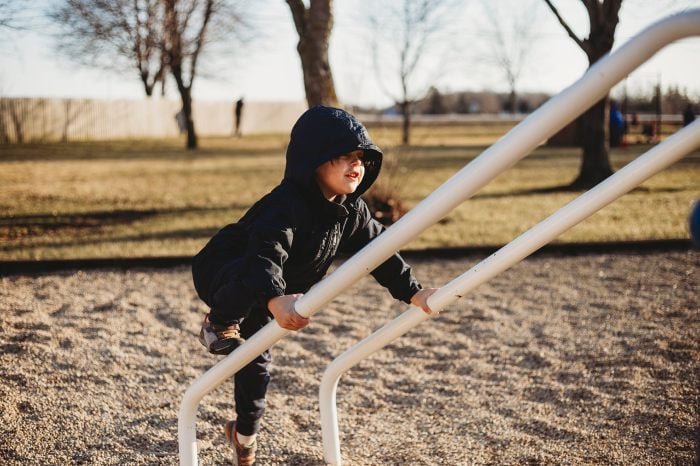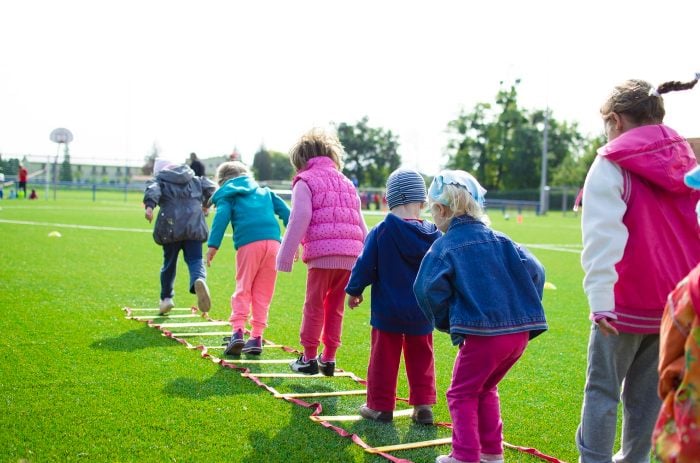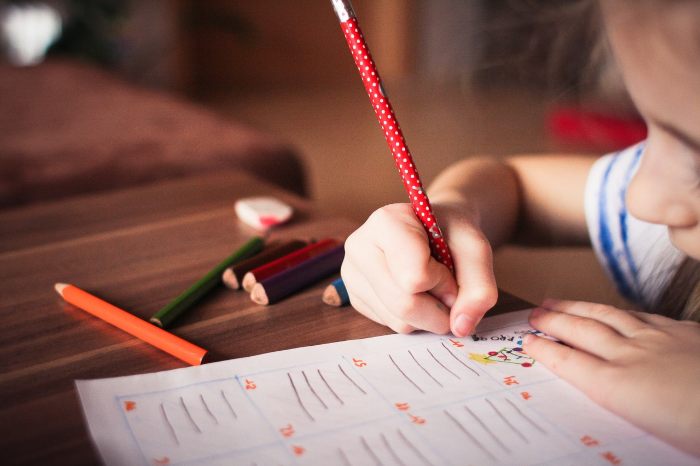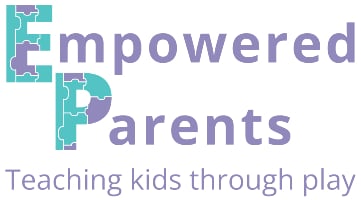What exactly are the benefits of play in early childhood and is it so necessary for our children to be playing every day?
Play is the most natural state for a child, and the state in which they learn anything and everything in the first few years of life.
While there seems to be a trend to move away from play-based learning to more academic learning in early childhood, little children are losing out on invaluable time when they are supposed to be learning pre-writing, pre-reading and early-maths skills through play.
So, what exactly are all these amazing skills that are developed through play? Let’s take a look at how play develops a child holistically.
1. Physical Benefits of Play
There are so many physical benefits of play.
A child’s physical development depends on building their gross motor and fine motor skills – which happens during play.
Gross Motor Skills

Gross motor skills include:
- Standing, running, climbing, pedalling, jumping, throwing, rolling, catching, balancing, kicking, hopping, skipping, hanging, stepping, riding, etc.
- Posture and the ability to sit at a desk and concentrate, balance and coordination, and many other things.
Children who do not develop their gross motor skills are less likely to participate in sports during their childhood and adolescence.

Fine Motor Skills
Gross motor skills must develop before fine motor skills.
Fine motor skills include:
- Building a tower, opening containers, tracing, holding a crayon, threading, cutting, completing a puzzle, dressing, brushing teeth, colouring, copying shapes, building with lego, drawing pictures, etc.
- When these skills are developed, pencil grip, finger strength and endurance are developed, which enables children to form letters and write on lines.

In order to learn to read and write, children need to develop their motor skills.
2. Cognitive Benefits of Play
Here are just a few ways children build cognitive development through play:
- Play improves memory and stimulates brain growth. Babies who are not stimulated do not follow the same developmental patterns as those who are. Play is essential for continuing this growth.
- Providing breaks helps with attention span. Preschoolers can focus for longer periods on quiet activities when they are given opportunities for free play. Children working on academic tasks are able to focus better when they are given breaks to play and move freely.
- During play, children are constantly solving problems in creative ways and developing their critical thinking skills.
- Early maths skills are developed during play in many ways. A common example is playing with and stacking blocks, which builds a number concept from a very young age.
- Play is full of exploration and experimentation – good skills for science and technology classes in the later grades.
- Expressive and receptive language is developed. Both receptive language (what a child hears) and expressive language (what a child says) are stimulated continuously while playing, especially during pretend play.
- Their auditory skills and ability to decipher sounds are developed, which lays the foundation for reading later on.
3. Social Benefits of Play
Children need strong social skills to function on a daily basis. These are built mostly through a child’s relationship with their parents and family, and through playing with peers.
Here are some of the many social benefits of play:
- During play, children learn to act appropriately in social situations and read body language.
- Rules usually exist during play, whether they are structured rules during a board game or rules invented as you go along in a pretend game of cowboys. It is important for children to learn to navigate how to follow expectations and find a balance between following others’ rules and asserting their own expectations confidently.
- During play, children learn to share, consider others, take turns, be fair and manage the game so that everyone involved has a positive experience.
- When conflicts arise, they are a good opportunity to learn to resolve them effectively, as well as independently.
4. Emotional Benefits of Play
Here are a few of the benefits of play for emotional development:
- Play offers a healthy outlet for children to release tension.
- Physical movement releases endorphins, contributing to children’s overall feeling of well-being.
- Play allows time to learn without worrying about failure, and encourages learning competence.
- Play teaches self-control, maturity, independence, healthy expression and regulation of emotions.
- Play builds personality, self-confidence and positive self-image.
- During pretend play, symbolic play and dress-up play, children are able to deal with life situations by acting them out.
Or, if you’d prefer, watch this video about free play explaining what real free play is and how to not overschedule your child’s free time.
Children need time, every single day, to be completely free to play. They need to invent their own games, solve their own problems and make their own discoveries.
So, if you’d like your children to become competent readers, spellers, mathematicians, and artists……then they probably need to climb more trees!


Wilhelmina Vries
Friday 30th of January 2026
I love this
Tanja McIlroy
Tuesday 3rd of February 2026
Thank you!
Aminath Masha
Wednesday 15th of February 2023
I love this article and it is very good for the parents to read more about these atticles. Then they will know how to teach their kids and how to get along with them .
Tanja Mcilroy
Thursday 16th of February 2023
Thank you, Aminath!
Anonymous
Wednesday 29th of December 2021
Thank you for this article! I babysit a preschooler occasionally, and I've noticed some of the things we've been doing in regards to learning aren't working out for him. I think some of it is from how much screen time he's exposed to at home (yikes!), but I'm wanting to adjust things so that he can be excited every time he comes here (and he is anyway!).
It can be tiring playing sometimes, especially when he wants to play Superheros outside...LOL!! But if it'll help...then why not? :) Thank you again!!!
Tanja Mcilroy
Thursday 30th of December 2021
It is tiring but definitely worth it! Thanks for reading.
kenzie
Wednesday 28th of July 2021
As an early childhood educator I know how important play is for young children. I witness it everyday, and I see the learning that is going on, even when they don't realize it! I wish this was something everyone would understand, that play and play based learning are the foundations in early childhood. They will not learn by sitting down at a table and memorizing flash cards. But using their senses, discovering, this is how they learn best. I hope that one day more and more classrooms transform to play based, as this is the most beneficial way!
Tanja Mcilroy
Wednesday 28th of July 2021
I agree 100%. I don't understand what the fascination is with flashcards, worksheets and tracing. They are so boring and don't teach small kids anything. Watching a child problem solve while building a structure with blocks - now that is fascinating. I hope what is happening now is a passing trend and that one day people will realize that just because a child is born into a fast-paced, modern world, doesn't mean they don't still need to develop naturally. Luckily for the kids, there are still a lot of teachers and parents out there like you!
salim
Sunday 11th of October 2020
Hello Tanja Mcilroy
For an infant, play is the most normal state, and which in the first few years of life they learn everything and anything. There has been a dramatic rise in the amount of screen time children are exposed to, as well as adult-driven post-school activities, over the past few years. This has resulted in a decline in the daily average time children engage in play. Really nice and simple post.
Tanja Mcilroy
Monday 12th of October 2020
Hi Salim, it is sad but unfortunately true. Thanks for reading!